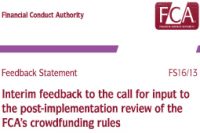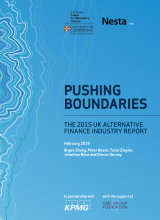
Last week the the FCA published its initial views from its review of the crowdfunding (investment and loan based) industry in Feedback Statement (FS16/13). While the detail of new rules will not be announced until 2017, it reveals some interesting points of view which are not only important for the platforms operating under this regulatory regime but also for the investors who lend their money through the platforms.
Below is a direct cut and paste from the FCA Feedback statement broken down into, firstly the FCA’s introduction of the review (specifically loan based crowdfunding), then the list of 15 questions the FCA asked and their responses to the replies they received and finally a summary of their findings and proposals for new rules.
Introduction
While some issues are common to both loan-based and investment-based crowdfunding these are two distinct markets subject to largely separate regulatory regimes.
In our view, aspects of the loan-based crowdfunding market currently pose some risks to our objectives. We perceive risk of regulatory arbitrage in the loan-based sector, and potential for investors to misunderstand the nature of the products offered. While investment-based crowdfunding is facilitated entirely by fully-authorised firms, most loan-based crowdfunding firms, including the largest ones, have so far operated under interim permissions.
Where firms operating under interim permission fail to meet the standards for full authorisation, this presents risks to their existing borrowers and lenders which require careful management.
Our focus is ensuring that investor protections are appropriate for the risks in the sector while continuing to promote effective competition in the interests of consumers. Based on our findings to date, we believe it is necessary to strengthen the consumer protections provided by our rules while continuing to ensure we promote competition in the sector. We plan to consult next year on new rules to address these concerns.
For both loan-based and investment-based crowdfunding platforms, for example, we see the following issues:
• it is difficult for investors to compare platforms with each other or to compare crowdfunding with other asset classes due to complex and often unclear product offerings;
• it is difficult for investors to assess the risks and returns of investing via a platform;
• financial promotions do not always meet our requirement to be ‘clear, fair and not misleading’; and
• the complex structures of some firms introduce operational risks and/or conflicts of interest that are not being sufficiently managed
Based on our experience of supervising firms in the loan-based crowdfunding market operating under interim permissions, we have a number of concerns. For example:
• Certain features introduce risks to investors that are not adequately disclosed and may not be sufficiently understood by investors. For example, the use of provision funds may obscure the underlying risk to investors, which may result in investors believing that platforms are providing an implicit guarantee of the loans they facilitate;
• The plans some firms have for wind-down in the event of their failure are inadequate to successfully run-off loan books to maturity; and
• We have challenged some firms to improve their client money handling standards
FCA Questions and Responses
Q1. Do you consider there is the potential for regulatory arbitrage with banking business? If so, what measures should be considered to address it?
FCA response
While some of the features of the market noted in the call for input existed in 2014, they have grown in significance and firm structures have grown in complexity. In addition, business models are becoming more complicated and look increasingly similar in substance to other, existing regulated activities (banking and investment management), but without being subject to the same regulatory requirements or offering the same consumer protections. We will continue to examine the feedback received, and to consider firm business models, as part of our ongoing authorisation and supervision work. If it appears that consumer detriment is likely, we will also consider introducing additional rules to reduce or remove the potential for arbitrage.
Q2. Do you have any concerns about, or evidence of, differences in the treatment between retail and institutional investors?
FCA response
While we cannot comment on individual reports of preferential treatment in this feedback statement, nevertheless the responses to this question raise concerns that some firms may not be managing their conflicts of interest adequately. We also believe it is unlikely to be possible to employ such arrangements and treat customers fairly. We will consider individual reports and wider implications in our ongoing supervision of the sector. In addition, as set out in Chapter 5, we are conducting research that will provide more data on the profile of investors. We will consider further intervention if we find that current business practice is creating a significant risk of consumer detriment.
Q3. Have you seen any initial evidence that the ISA wrapper has led to consumers not fully appreciating the risks involved in Innovative Finance ISA investments?
FCA response
Our work before introducing the regime in 2014 suggested that current, active investors have greater understanding of the sector and its risks than those who do not invest in it. We are undertaking research into investors’ knowledge, experience, expertise, behaviour and expectations. This will help us test whether the market has changed since 2014.We do not believe past investment in other investments, such as stocks-and-shares ISAs, means that investors necessarily appreciate the liquidity risk, under-diversification risk and operational risks on platforms. We are therefore concerned about any significant change to the investor population that could arise.
On the evidence submitted to us so far, we believe the Innovative Finance ISA is likely to appeal to a significant number of investors, primarily those already engaged with the sector. We expect the Innovative Finance ISA to compete for funds with both cash ISAs and stocks-and-shares ISAs as investors search for yield. However, we do not have evidence that a significant share of the existing ISA investor population is likely to choose to become crowd investors instead.
Q4. Are there differences in borrower protection between commercial and non-commercial agreements that would be best addressed by applying additional rules to platforms, or are the existing rules adequate?
FCA response
The definition of the term ‘non-commercial agreement’ is in the CCA (‘a consumer credit agreement or a consumer hire agreement not made by the creditor or owner in the course of a business carried on by him’). The form and content rules for regulated credit agreements are set out in CCA secondary legislation. The FCA is under an obligation to review the retained CCA provisions and to report to Government by April 2019. We published a Call for Input in February.We will consider the calls for guidance and to review the ‘borrower’ definition in our ongoing work.
Q5. Do you agree with our analysis of the key developments in the loan-based crowdfunding sector over the last two years?
FCA response
We plan to analyse the matters mentioned by respondents in our ongoing work. As always, we will seek to avoid inappropriate or disproportionate regulatory standards and we will only consult on new rules if the benefits outweigh the costs.To address a potential discrepancy in mortgage lending, we propose to consult on applying the usual mortgage lending standards to platforms where the investor/lender is not acting by way of business and the platform facilitates residential mortgage contracts.
Q6. Are you aware of current or emerging risks that firms’ current infrastructure, systems and controls might not be adequate to deal with?
FCA response
We will take account of these responses in our work, both in day-to-day supervision and in ongoing research for the post-implementation review.
Q7. Do you have any comments on our concerns over the development of new loan-based crowdfunding business models? Have there been other specific developments that are relevant to the high-level standards summarised above?
FCA response
We continue to conduct research and analysis into the market to inform our thinking on the extent market development gives rise to potential consumer detriment.
Q8. Do you have any comments on the standards of disclosure on loan-based crowdfunding platforms?
FCA response
We remain concerned that standards of disclosure do not meet our expectations. To aid firms and to raise standards, we plan to consult on additional provisions to provide a consistent minimum basis for investor disclosures.
Q9. Are our current financial promotion rules for loan-based crowdfunding promotions proportionate? If not, can you please provide examples?
FCA response
We will consider the points raised in these responses during our planned consultation on additional rules for the disclosure and financial promotion of crowdfunding to investors.
We do not agree that loan-based crowdfunding could be described as a ‘savings’ product. We believe detriment is possible if investors regard loan-based crowdfunding as a type of deposit as the risks, particularly to capital, are different.
Section 21 of FSMA prohibits the communication of financial promotions unless certain conditions are met. Businesses should not communicate invitations or inducements to invest unless they meet they conditions in the Act.
Q10. Is our approach to online and social media promotions proportionate? Do you have any suggestions as to how to improve our rules or approach on promotions?
FCA response
The FCA consulted in 2015 on guidance on using social media for financial promotions.Our work on Smarter Consumer Communications is also relevant.
In the section of that paper dealing with risk warnings and other required statements in social media, we said that ‘we will be undertaking further work and testing in this area and would welcome further discussion with firms on new and innovative approaches.’ Respondents interested to discuss this further may wish to contact us, using the contact details in the Smarter Consumer Communications paper.
Q11. Should we require loan-based crowdfunding platforms to assess investor knowledge or experience of the risks involved? What would a proportionate requirement look like?
FCA response
The research for the review may corroborate feedback from those respondents who said that retail investors have sufficient knowledge of the risks involved in loan-based crowdfunding. However, if we find that investors do not understand the risks, particularly of the more complicated business models, we will consider the need for further rule changes.
Q12. What effect do you think loan-based crowdfunding has had on competition in lending and investment/savings markets?
FCA response
As the market share of loan business accounted for by the loan-based crowdfunding sector remains small, there appears to have been only limited direct impact on traditional lenders to date. As some respondents observed, however, in some sectors or parts of sectors – such as lending to small and medium enterprises – the sector is growing faster and provides more competition to traditional lenders.
Q13. Where do you think regulations could be amended to increase confidence in loan-based crowdfunding markets, encourage the development of the markets in the interest of consumers or increase competition by removing uneven playing fields?
FCA response
The FCA has an operational objective to promote effective competition in the interests of consumers. We recognise that crowdfunding and, given its size, particularly loan-based crowdfunding, has the potential to exert beneficial competitive pressure on the market for consumer and small business lending. As we continue with the post-implementation review and in our ongoing work in the crowdfunding sector, we will take account of responses to this question.
Q14. Do you have any comments on the resolution plans of firms operating loan-based crowdfunding platforms?
FCA response
We are concerned that, in practice, wind-down plans may not work as expected, and may be inadequate to enable a loan book to be administered to conclusion in the event of platform failure. To help guard against this, we propose to consult on strengthening the rules in this area.
Q15. Are there any other matters we should take into account in the post-implementation review of loan-based crowdfunding?
FCA response
We will continue our review to analyse the market and will consider the issues flagged by respondents to this question.We are conducting a separate review into the way that the FSCS is funded and will decide whether, following market growth and development and, having regard to any concerns that might be raised by respondents to that consultation, the position for loan-based crowdfunding should be changed.
The FCA is only responsible for some parts of the crowdfunding market in the UK and cannot control terminology use across all sectors. Our preferred approach is to refer to all platforms as crowdfunding, whether they focus on the investment-based or loan-based sectors, or both. We note that our use of terminology is consistent with that of the EU institutions.
Some issues now under review – such as the increasing use of platforms to facilitate asset management-style activity – cut across both sectors. We therefore propose to retain our terminology and to continue to deal with both sectors in the same documents.
Summary of findings
The FCA is conducting work with firms to collect evidence on potential risks and address any knowledge gaps. This work, which is still in progress, has covered about two thirds of the loan based crowdfunding market by volume, across the personal, business and property-lending sectors.
Some of the interim results from our work on loan-based crowdfunding are as follows:
- We found inadequate disclosures about risk and loan performance;
- Firms are testing the boundaries of the regulated crowdfunding perimeter, which introduces the risk of arbitrage with investment management or banking activities;
- Firms’ desire to maintain confidence in platforms has occasionally led to firms acting in a non-transparent manner, masking true loan performance and exposing investors to risks. This has included management intervening to influence the performance of loans (e.g. by covering arrears) or otherwise acting to support the platform (e.g. lending to provision funds);
- Firms have limited scope to increase market share with their current products and are instead targeting growth through new products or in new markets. This brings the risk of operating in unfamiliar markets without appropriate expertise, exposing longer-term investors to unforeseen lending risks;
- Consumers may not realise they do not have the usual protections as borrowers, where agreements are non-commercial, and firms may not make them aware of this;
- Institutional investors could bring benefits for retail investors (e.g. due diligence) but better controls are needed to mitigate the risks – particularly around conflicts of interest;
- Some platforms allow investment in loans formed on other platforms, which can make it harder for investors to conduct due diligence or to understand the level of risk they are taking. Failure of one firm could also cause problems for other firms in the market where investors in one platform are exposed to loans on a third-party platform.
Proposals for new rules
Through our work to date, we have identified some specific concerns for which we consider there is potential for consumer harm to warrant consulting on additional rules. We are planning to consult on the following areas.
- Under our current rules, firms should have arrangements in place such that, in the event of their failure, existing loans continue to be administered. Our experience of authorising and
supervising firms suggests that wind-down plans could be improved to reduce the risks to investors of the plans not operating as expected. We propose to strengthen the rules and
plan to consult on additional requirements; - Some firms operating loan-based crowdfunding platforms allow investment in loans originated on other platforms. Where the firm acts as an aggregator and does not originate
loans, this is less likely to represent a risk to our objectives. However, where other firms allow cross-investment, we are concerned that this may give rise to risks to investors as
the failure of one platform may have a direct impact on the viability of others. We plan to consult on additional requirements or restrictions on cross-investment; - In the call for input we discussed our plans to consult on extending the usual mortgage-lending standards to loan-based crowdfunding platforms where the investor/lender is not
acting by way of business. This was received positively by respondents and we will now proceed with the consultation; - We have concerns about the quality of communications with potential investors, particularly financial promotions. We remain concerned that standards of disclosure do not meet our expectations. As well as ongoing supervision of existing rules, we plan to consult on more prescriptive rules on the content and timing of disclosures we expect to see.
Further research
As a current lender or a potential lender you may be interested to know that the FCA in conjunction with The Cambridge Centre for Alternative Finance at Cambridge Judge Business School, University of Cambridge is carrying out further research directly with investors. Proplend has been asked to assist with this research and have previously published a link to a 15 minute anonymous questionnaire if you have any interest in making your views known or helping to shape the future of the loan based crowdfunding industry.


